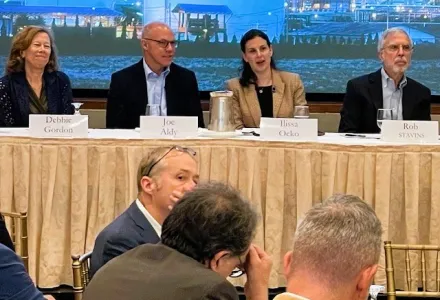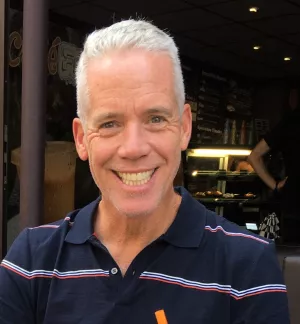New technologies are making possible significant reductions in methane emissions in the oil and gas sector as part of an overarching strategy to address climate change. That was the focus of discussion last Thursday (September 25, 2025) at a panel convened as part of Climate Week New York City, sponsored by the Harvard Initiative on Reducing Global Methane Emissions, a research cluster of Harvard’s Salata Institute for Climate and Sustainability. The panel was moderated by Harvard Project on Climate Agreements (HPCA) Director Robert Stavins.
“Methane-Emissions Abatement in the Oil & Gas Sector: Costs and Opportunities” highlighted the relevant research taking place at the Salata Institute and elsewhere, and featured perspectives from three leading authorities in the field: Joseph Aldy, Teresa and John Heinz Professor of the Practice of Environmental Policy at Harvard Kennedy School; Ilissa Ocko, Senior Climate Scientist at Spark Climate Solutions; and Deborah Gordon, Senior Principal for Methane and Oil and Gas Solutions at RMI.
Speakers’ presentations are linked to the red buttons near the top of this page
Reducing Methane Emissions
Stavins framed the discussion by underscoring the importance and urgency of reducing methane emissions.
“Approximately 30 percent of climate change since the Industrial Revolution is linked with methane emissions,” he stated. “Because methane is a relatively short-lived greenhouse gas but has great radiative forcing potential, methane emissions abatement can significantly reduce greenhouse gas concentrations, therefore climate change, therefore damages, particularly in the short term, which…gives the world time to bend the curve on CO2 emissions, conduct research on both carbon mitigation and carbon removal, and implement longer term strategies to mitigate and to adapt to climate change.”
International Initiatives Make Progress
Stavins also argued that while there is retrenchment on climate policy in the U.S. at the moment, particularly on the federal level, efforts to address the problem elsewhere continue full steam ahead.
“There's now a very complex, very full landscape of international initiatives to reduce methane emissions. These include not only governments but numerous industry groups and NGOs,” he remarked. “[Those] include the Paris Agreement NDCs, the Global Methane Pledge, a whole set of industry consortia that have put forward pledges and mechanisms, and some very significant NGO partnerships.”
Short- and Long-term Solutions
Ocko’s remarks focused on the ways in which taking action on methane can reap both short- and long-term benefits. Solutions, she noted, require three critical factors.
“First, we need a clear motivation… We have this problem, it’s urgent, and there are clear benefits of action. We also need viable solutions, not in terms of just the technology being available, but also our ability to implement those solutions and scale them and have that be cost effective,” she stated. “We also need enabling frameworks, and this is where the policies come into play and all the different plans, but also accountability to follow through with all those goals that we have. And we need funding for this as well.”
Ocko reiterated that methane is the second largest contributor to global warming, second only to CO2 emissions.
“It’s [responsible for] a large share of current warming and so obviously it’s a major driver of climate change. So, taking action on [methane emissions] will have major benefits to the climate,” she said. “The moment we stop replenishing the atmosphere with methane, we can eliminate that warming impact… It’s the fastest way to slow down warming.”
Cost Model Analysis
Aldy then presented his research, with Stavins and Harvard Business School professor Forest Reinhardt, focused on better estimating the cost of reducing methane emissions in the oil and gas industry (i.e., abatement costs).
“Common in this literature are engineering cost models… These [approaches specify] equipment that can be installed or changes in processes that you could implement…at a model plant,” he remarked. However, Aldy stated that engineering models typically leave out some important costs — such as those associated with detecting, measuring, and locating emissions, and those costs associated with bringing additional gas to market.
“Engineering models help us think prospectively but are likely to be overly optimistic about abatement costs,” Aldy said.
Aldy then summarized published economics research employing econometric (i.e., statistical) methods to estimate abatement costs retrospectively, using actual data on natural gas prices and other parameters. This research is, indeed, the focus of the first paper released by his project.
Targeted Solutions
Gordon then responded to Aldy’s presentation and discussed her own research, which focuses on how differentiating methane intensity (and other characteristics) of oil and gas production can lead to targeted mitigation solutions that could reduce methane emissions by as much as 90 percent.
“Oil is about differences, not similarities, and understanding differences really helps you understand what's going on… There are a lot of reasons why gas leaks, and you need to…identify what types of [oil and gas] emissions sources — [are involved with a particular leak]. And then you have loads of policy options.” she stated. “There are so many different mitigation strategies. The issue is finding the right one for the [specific type of oil and gas].”
Gordon referenced how newly emerging data resources and online tools are helping researchers and policymakers develop emission reduction strategies with greater precision than ever before. Among these tools are Climate Trace, Carbon Mapper — and Gordon and her team’s Oil Climate Index plus Gas (OCI+).
“We’re going to get more and more data over time to really see the full universe of what is happening in this industry that is often unknown to an operator because methane, especially at the point of extraction, is always invisible and odorless,” she remarked. “There are small leaks, but what we are finding more and more, and Carbon Mapper highlights, is there are super-emitting events happening…in certain times and places, and they can be an overriding concern on what’s going on.”
“It's not to say that this is a complete picture yet, but I do think a lot of satellite detection, as we have more and more years under our belt, [is] going to create a fuller picture of what's really going on in the sector,” Gordon said.
The panel concluded with a Q-and-A session, with questions ranging from methane detection costs to long-term emission reduction scenarios to government led efforts to limit methane intensity.
The discussion was one of hundreds of Climate Week NYC events – including several focused on methane — which convened thousands of thought leaders and experts from the worlds of business, tech, politics, academia, and civil society with the means, scale, and ideas to take bold action.



